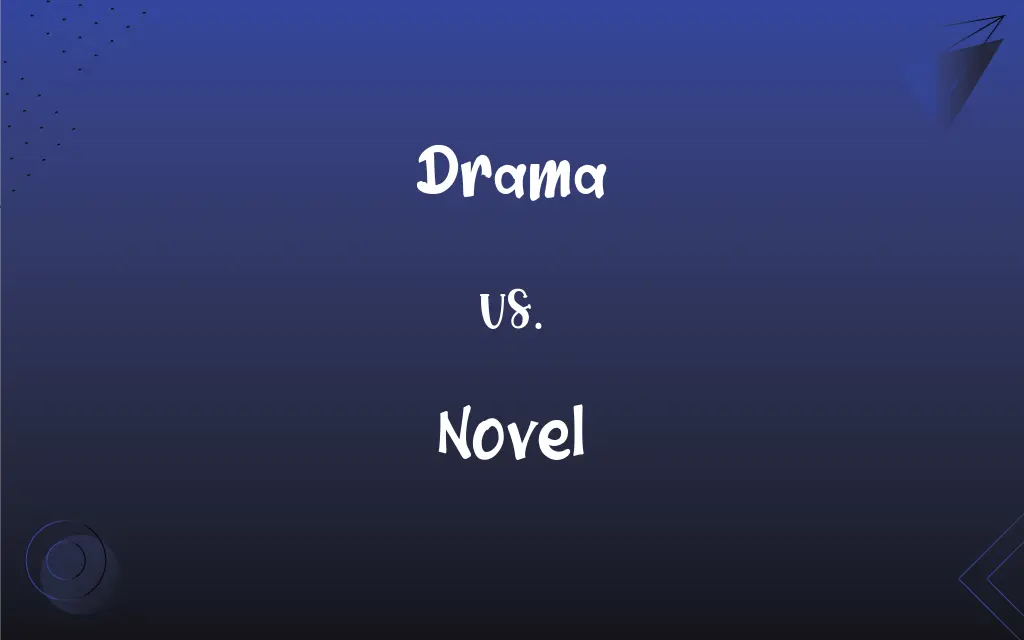Drama vs. Novel: What's the Difference?
Edited by Harlon Moss || By Janet White || Published on December 1, 2023
Drama is a performance art involving actors and dialogue, intended for a live audience, whereas a novel is a lengthy, fictional narrative in prose form, designed for private reading.

Key Differences
Drama is a form of literature intended for theatrical performance, where actors portray characters and deliver dialogue. Novels, conversely, are lengthy fictional works, written in prose, primarily intended for personal reading.
Dramatic works often rely on dialogue and stage directions for storytelling, with little to no narration. Novels provide a comprehensive narrative, including descriptions, internal thoughts, and background information.
In drama, the audience's engagement is through visual and auditory experiences, with sets, costumes, and lighting playing crucial roles. In novels, the reader's imagination creates the visual and emotional landscape, guided by the author's descriptions.
The effectiveness of drama hinges on the actors' performance and the director's interpretation. In contrast, novels allow individual readers to interpret the text personally, often leading to varied interpretations.
Dramas are typically structured in acts and scenes, with a focus on dialogue and immediate action. Novels, however, can explore complex narratives, with detailed character development and expansive settings.
ADVERTISEMENT
Comparison Chart
Form
Script for theatrical performance
Lengthy fictional narrative in prose
Primary Elements
Dialogue, stage directions
Narrative, descriptions, internal thoughts
Mode of Consumption
Live performance, visual and auditory
Personal reading, imaginative engagement
Storytelling Method
Actors' portrayal, director's vision
Author's written narrative
Structure
Acts and scenes
Chapters, varied narrative techniques
ADVERTISEMENT
Drama and Novel Definitions
Drama
A work intended for stage performance by actors.
The school's drama club performed a classic Shakespeare play.
Novel
A long, fictional narrative written in prose.
Her favorite novel was a thrilling mystery set in Victorian London.
Drama
A theatrical work that explores human conflicts and emotions.
The drama's portrayal of historical events was both educational and moving.
Novel
A literary work exploring characters, settings, and plots in depth.
The novel delved into the protagonist's inner world with exquisite detail.
Drama
An art form that combines text, performance, and visual elements.
Modern drama often incorporates multimedia elements to enhance the story.
Novel
A form of storytelling that allows for extensive character development.
The novel's complex characters evolved significantly over its span.
Drama
A genre of literature characterized by scripted dialogues and theatrical presentation.
She wrote a compelling drama about the complexities of family life.
Novel
A book-length work of fiction, often encompassing various themes and motifs.
His latest novel explores themes of love, loss, and redemption.
Drama
A narrative form where the story is conveyed through dialogue and action.
The drama captured the audience with its intense emotional scenes.
Novel
An imaginative work providing a detailed narrative experience.
Reading the novel transported her to a fully realized fantasy world.
Drama
A prose or verse composition, especially one telling a serious story, that is intended for representation by actors impersonating the characters and performing the dialogue and action.
Novel
A fictional prose narrative of considerable length, typically having a plot that is unfolded by the actions, speech, and thoughts of the characters.
Drama
A serious narrative work or program for television, radio, or the cinema.
Novel
The literary genre represented by novels.
Novel
Strikingly new, unusual, or different.
Novel
Newly made, formed or evolved; having no precedent; of recent origin; new.
Novel
Original, especially in an interesting way; new and striking; not of the typical or ordinary type.
Novel
A work of prose fiction, longer than a novella.
Novel
(historical) A fable; a short tale, especially one of many making up a larger work.
Novel
(obsolete) A novelty; something new.
Novel
A new legal constitution in ancient Rome.
Novel
Of recent origin or introduction; not ancient; new; hence, out of the ordinary course; unusual; strange; surprising.
Novel
That which is new or unusual; a novelty.
Novel
News; fresh tidings.
Some came of curiosity to hear some novels.
Novel
A fictitious tale or narrative, longer than a short story, having some degree of complexity and development of characters; it is usually organized as a time sequence of events, and is commonly intended to exhibit the operation of the passions, and often of love.
Novel
A extended fictional work in prose; usually in the form of a story
Novel
A printed and bound book that is an extended work of fiction;
His bookcases were filled with nothing but novels
He burned all the novels
Novel
Of a kind not seen before;
The computer produced a completely novel proof of a well-known theorem
Novel
Pleasantly novel or different;
Common sense of a most refreshing sort
FAQs
How do dramas convey stories?
Dramas convey stories through scripted dialogue and actors' performances.
What defines a drama?
A drama is defined as a work intended for stage performance, characterized by dialogue and action.
What is the main characteristic of a novel?
The main characteristic of a novel is its length and comprehensive narrative in prose form.
How long is a typical novel?
Novels vary in length but are typically longer than short stories or novellas.
What role does the audience play in drama?
The audience plays a vital role in drama, experiencing the story through visual and auditory elements.
What distinguishes a novel from a short story?
A novel is distinguished from a short story by its length and depth of narrative.
What is unique about novel storytelling?
Novel storytelling is unique for its in-depth exploration of characters, settings, and plots.
Are dramas always performed live?
Dramas are typically written for live performances, though they can be adapted for film or TV.
Can a novel be based on true events?
Yes, novels can be based on true events but are generally categorized as fiction.
Can dramas be read as literature?
Yes, dramas can be read and appreciated as literary works.
What are common themes in novels?
Novels often explore themes like love, conflict, adventure, and personal growth.
How important are actors in drama?
Actors are crucial in drama, as they bring the script and characters to life.
What are the elements of drama?
The key elements of drama include plot, character, dialogue, setting, and theme.
Can novels be adapted into other forms?
Yes, novels can be adapted into films, TV series, plays, and more.
How do novels impact readers?
Novels can significantly impact readers by offering new perspectives, emotional experiences, and intellectual stimulation.
Is improvisation used in drama?
Improvisation can be used in drama, though most rely on scripted dialogue.
What is the role of description in novels?
Description in novels plays a key role in creating imagery and conveying the inner thoughts of characters.
Are there different genres of drama?
Yes, drama includes various genres like tragedy, comedy, and historical.
What is a playwright?
A playwright is someone who writes dramas or plays.
Do novels always follow a linear narrative?
Novels can follow linear or non-linear narratives, depending on the author's style.
About Author
Written by
Janet WhiteJanet White has been an esteemed writer and blogger for Difference Wiki. Holding a Master's degree in Science and Medical Journalism from the prestigious Boston University, she has consistently demonstrated her expertise and passion for her field. When she's not immersed in her work, Janet relishes her time exercising, delving into a good book, and cherishing moments with friends and family.
Edited by
Harlon MossHarlon is a seasoned quality moderator and accomplished content writer for Difference Wiki. An alumnus of the prestigious University of California, he earned his degree in Computer Science. Leveraging his academic background, Harlon brings a meticulous and informed perspective to his work, ensuring content accuracy and excellence.






































































